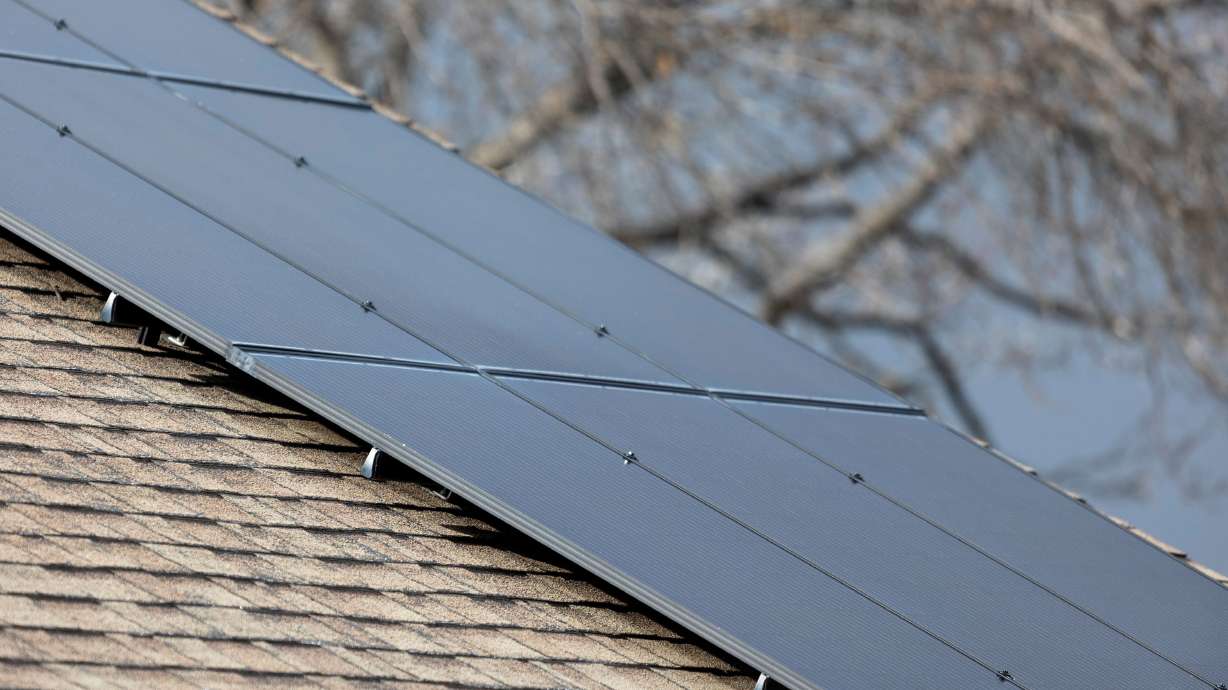Estimated read time: 4-5 minutes
This archived news story is available only for your personal, non-commercial use. Information in the story may be outdated or superseded by additional information. Reading or replaying the story in its archived form does not constitute a republication of the story.
SALT LAKE CITY — A proposal that would alter the rate at which rooftop solar customers are credited for the excess energy going to Rocky Mountain Power survived a legislative committee hearing Thursday, but it is clear questions remain.
SB189, sponsored by Sen. Wayne Harper, R-Taylorsville, passed on a 4-2 vote out of the Senate Transportation, Public Utilities, Energy and Technology Committee and will get a debate before the full Senate.
Harper explained the bill brings certainty to rooftop solar customers about what energy credit they can expect from year to year, which now varies. It caps that export credit rate at 84% of the actual customer cost per kilowatt.
That compensation rate can vary from year to year, Harper said, and is a deterrent for would-be adopters of rooftop solar.
"This bill really deals with a couple things. It deals with predictability, reliability, continuity. It assists customers in Rocky Mountain Power to make their best decisions for themselves and their homes," he said.
Harper said the measure was worked on for months over the summer, and he concedes there remains disagreement.
"I apologize for that," he said.
At the same time, he said rooftop solar customers deserve certainty, especially potential customers who have difficulty in determining if the choice is fiscally sound moving forward.
The debate
Sarah Wright, executive director of Utah Clean Energy, said rooftop solar provides important benefits to the grid, helps the utility company avoid certain infrastructure costs by providing locally-generated energy and is a renewable resource that helps in Utah's attempts to diversify its energy portfolio.
"I've had some really smart people in Utah call me and say, 'Sarah, I'm smart. I should be able to figure out the economics of putting in the system,' but because the rate changes every year, and because you don't know when you're sending it to the grid, it's really hard."
The bill does not affect customers grandfathered into the net metering system in place prior to 2017 and compensated on a 1-to-1 ratio.
According to the clean energy organization, Rocky Mountain Power charges its customers about 10 cents for every kilowatt-hour the utility provides, but it only credits Utah solar owners around 50% of that rate, around 5 cents, for each kilowatt-hour they send to the grid.
Harper said the bill will guarantee that residential and small commercial solar customers served by a utility with 200,000 customers or more receive a bill credit that is at least 84% of the actual customer cost per kilowatt.
Representatives of several solar companies argued in favor of the bill and said the uncertainty is dissuading the pursuit of rooftop solar in Utah.
Bryson Garbett. president and chief executive officer of Garbett Homes, said the fluctuating rate has made it financially unfeasible to pursue rooftop solar.
"We build about 300 homes every year. And we used to put solar as standard on our homes and our apartments back when it was 1-to-1 net metering amount. (When it was changed) we had to do away with our program because it no longer worked economically and it was no longer feasible and make any sense to put solar on a home," Garbett said.
But Jon Cox, with Rocky Mountain Power, said that extra mandated bump in the export credit as outlined in the legislative proposal runs counter to the energy market economics and would force the utility to purchase that excess solar from customers at a rate that represents a direct "pass through" to other customers.
The utility company can purchase energy on the open market for about 3 cents per kilowatt compared to 9 cents, which the bill calls for.
"And as a utility provider, we're just trying to provide a reliable system that is the lowest cost to our customers."
'Straight to the customers'
But Stan Holmes, with Utah Citizens Advocating for Renewable Energy, said the current system is broken.
"We appreciate the SB189 sponsor's recognition that Utah's current net metering situation is fraught with flaws, harms the solar business community and does not serve the public's best interests," he said. "SB189 offers an opportunity to set things right to engage the public and is a renewed, overdue discussion of the benefits distributed generation electricity brings to ratepayers and the general public and Utah."
Michelle Beck, director of the Utah Office of Consumer Affairs, argued the measure sets up an unfair system for customers who don't use solar power.
"This is a subsidy. Because the way it is set up, it's going straight to other customers," she said.
Utah Clean Energy and others argued the measure does not equal a subsidy.
While customers paid Rocky Mountain Power an average of about 10 cents per kilowatt-hour in 2023, Rocky Mountain Power credited solar customers only about 5 cents per kilowatt-hour of solar energy exported to the grid during 2023, the group said.
Harper said he'd never seen an instance in which net metering for solar was used as a basis by Rocky Mountain Power to justify a rate case before the Utah Public Service Commission.










